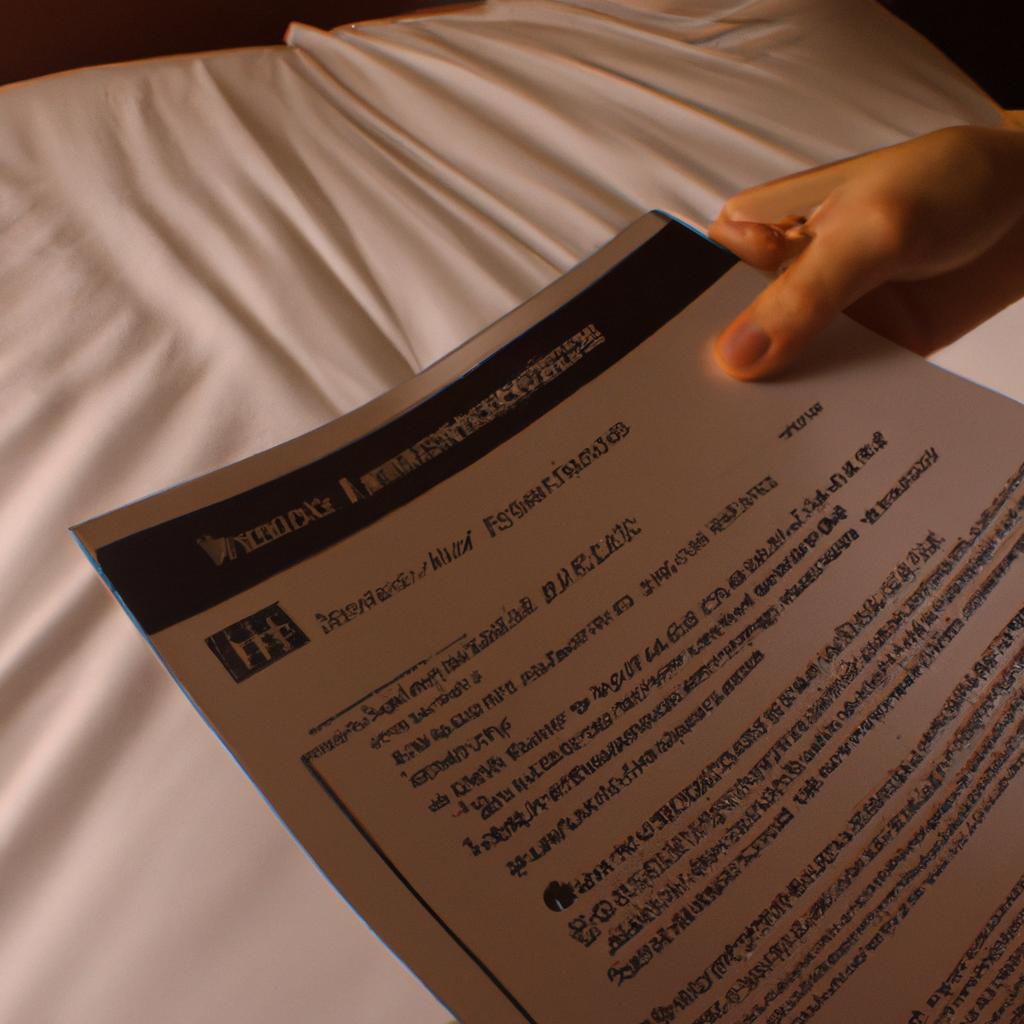Cancellation policies are a vital aspect of hotel reservations that often go unnoticed until it’s too late. Understanding these policies is crucial for travelers to avoid unexpected charges and ensure a smooth travel experience. For instance, imagine booking a luxurious beachfront resort for a week-long vacation, only to find out later that the cancellation policy requires a 72-hour notice. Failing to cancel within this window would result in being charged for the entire stay, leaving you with an unwelcome financial burden.
In order to navigate through such situations successfully, it is essential to comprehend the intricacies of hotel cancellation policies. This article aims to shed light on the importance of understanding these policies by providing insights into common practices employed by hotels worldwide. Additionally, it will explore various factors that influence cancellation deadlines, such as seasonality and demand fluctuations. By delving into these aspects, readers will be equipped with valuable knowledge necessary to make informed decisions when making hotel reservations and effectively manage any potential changes in their travel plans.
Types of Cancellation Deadlines
Imagine this scenario: You have meticulously planned a vacation and booked a hotel room at your dream destination. However, due to unforeseen circumstances, you are forced to cancel your trip. In such situations, understanding the cancellation policies of hotels becomes essential. There are various types of cancellation deadlines that hotels impose, each with its own set of rules and implications.
To begin with, one common type is the same-day cancellation deadline. This policy requires guests to cancel their reservation by a certain time on the day of check-in to avoid any charges. For instance, if the deadline is 6 PM local time and you fail to cancel before then, you may be charged for one night’s stay even if you do not end up occupying the room.
Another type is the 24-hour cancellation deadline. Here, guests must cancel their reservation at least 24 hours prior to check-in to avoid penalties or fees. Failure to adhere to this requirement could result in being charged for one night or more depending on the hotel’s policy.
In some cases, hotels enforce non-refundable cancellation policies where no refunds will be issued regardless of when the cancellation occurs. This means that once you book a room under this policy, there is no possibility of getting your money back should you need to cancel.
Understanding these different types of cancellation deadlines can help travelers make informed decisions regarding their reservations. To further illustrate the impact of these policies on potential guests’ emotions and experiences when faced with unexpected cancellations, consider the following:
- Anxiety: The fear of losing money due to last-minute changes in plans can cause significant stress.
- Frustration: Discovering high penalty charges after having canceled just slightly beyond the allowed timeframe can lead to frustration.
- Relief: Feeling relieved when managing to cancel within the required period without incurring any additional expenses.
- Disappointment: Experiencing disappointment upon realizing that booking under a non-refundable policy means no possibility of recuperating any funds.
In summary, the various types of cancellation deadlines imposed by hotels play a crucial role in managing reservations and ensuring clarity for both guests and establishments. Being aware of these policies helps travelers make well-informed decisions about their bookings while considering potential emotional responses to different scenarios. Now let’s explore the factors that can influence cancellation deadlines.
Factors That Affect Cancellation Deadlines
Factors that Affect Cancellation Deadlines
Cancellation deadlines for hotel bookings can vary significantly depending on several factors. Understanding these factors is essential to avoid any unnecessary fees or potential complications when canceling a reservation. Let’s delve into the various elements that influence cancellation deadlines and how they impact your booking experience.
To illustrate, consider a hypothetical scenario where you have booked a room at a popular beachfront resort for an upcoming vacation. Unfortunately, due to unforeseen circumstances, you need to cancel your reservation. However, upon reviewing the hotel’s cancellation policy, you notice that there are different types of cancellation deadlines in place.
Firstly, some hotels may enforce strict cancellation policies with non-refundable rates, meaning if you cancel after a certain deadline or fail to show up at all, you will not receive any money back. This type of policy aims to secure revenue for the hotel by discouraging last-minute cancellations and no-shows. As a result, it is crucial to carefully review the terms and conditions before making a non-refundable booking as this option offers limited flexibility.
On the other hand, many hotels offer more lenient cancellation policies for standard reservations. These policies typically allow cancellations without penalty up until a specific deadline—often 24 hours prior to check-in time. Such flexible options provide guests with peace of mind knowing they can adjust their plans if necessary without incurring additional charges.
Factors influencing cancellation deadlines include:
- Seasonality: During peak travel periods when demand is high (e.g., holidays or special events), hotels tend to implement stricter cancellation policies.
- Length of Stay: Longer stays might require earlier cancellations due to higher room demand and potential loss of revenue from canceled nights.
- Rate Type: Different rate categories may have varying cancellation terms, with non-refundable rates often having more restrictive policies compared to refundable ones.
- Individual Hotel Policies: Each hotel has its own guidelines regarding cancellations; therefore, it is vital to familiarize yourself with their specific terms.
To further illustrate the impact of these factors, consider the following table:
| Hotel | Seasonality | Length of Stay | Rate Type |
|---|---|---|---|
| A | High | Short | Non-Refundable |
| B | Low | Long | Refundable |
| C | High | Long | Non-Refundable |
As shown above, Hotel A enforces a non-refundable rate during peak season for shorter stays. In contrast, Hotel B offers more flexibility due to its longer stay policy and low season rates. Lastly, Hotel C combines both high-season restrictions and non-refundability for longer durations.
In conclusion, understanding hotel cancellation policies is crucial when planning your accommodation. By considering factors such as seasonality, length of stay, rate type, and individual hotel policies, you can make informed decisions that align with your travel needs. Now let’s explore another aspect related to hotel bookings: understanding non-refundable bookings and their implications on cancellations.
Understanding Non-Refundable Bookings
Cancellation policies can vary greatly among hotels, and understanding the specific terms and conditions is crucial for travelers. In this section, we will delve deeper into non-refundable bookings within hotel cancellation policies to provide a comprehensive overview of their implications.
Imagine you have booked a stay at a luxurious beachside resort for your upcoming vacation. Unfortunately, due to unforeseen circumstances, you are no longer able to travel during the planned dates. As you examine the hotel’s cancellation policy, you discover that your reservation falls under the category of non-refundable booking. This means that if you cancel or modify your reservation, you will not receive any reimbursement for the amount paid.
Non-refundable bookings act as an agreement between guests and hotels where guests agree to pay upfront in exchange for securing a discounted rate or special offer. Hotels often implement these policies to minimize losses from canceled reservations and maximize revenue certainty. While non-refundable bookings may appear appealing initially due to lower rates, it is important to carefully consider potential risks before committing.
To shed further light on the implications of non-refundable bookings, let us explore some key factors associated with this type of reservation:
- Limited flexibility: Non-refundable bookings usually come with strict penalties for cancellations or modifications. Guests forfeit their payment entirely without any opportunity for reimbursement.
- Risk management: Hotels employ non-refundable booking options as part of their risk mitigation strategies. By ensuring guaranteed revenue through these reservations, hotels can better manage their operations and allocate resources effectively.
- Demand fluctuations: The implementation of non-refundable bookings allows hotels to anticipate future demand accurately. With a clearer picture of expected occupancy levels, they can optimize pricing strategies accordingly.
- Competitive advantage: Offering discounts exclusively tied to non-refundable bookings gives hotels a competitive edge by attracting price-sensitive customers who prioritize cost savings over flexibility.
To summarize, understanding the intricacies of hotel cancellation policies is essential when making reservations. Non-refundable bookings present both advantages and disadvantages, requiring travelers to carefully weigh their options before committing to such arrangements.
[INSERT TRANSITION SENTENCE HERE ABOUT HOW TO MODIFY OR CHANGE A RESERVATION]How to Modify or Change a Reservation
In the previous section, we discussed the concept of non-refundable bookings and their implications for hotel guests. Now, let’s delve deeper into understanding these policies to ensure you are well-informed before making any reservations.
To illustrate the impact of non-refundable bookings, consider a hypothetical scenario involving a traveler named Sarah. Sarah decides to book a non-refundable room at a beachfront resort for her upcoming vacation. Unfortunately, unforeseen circumstances arise, and she is unable to embark on her trip as planned. Despite this change in plans, Sarah is not entitled to a refund due to the nature of her booking.
It is important to be aware of several key factors when it comes to non-refundable bookings:
- Strict cancellation policy: Hotels with non-refundable bookings usually have strict cancellation policies that do not allow for refunds or changes once the reservation has been made.
- Cost-saving potential: Non-refundable rates often come at a lower price compared to flexible options. This can be an attractive aspect for travelers who are certain about their travel dates and unlikely to make any last-minute modifications.
- Limited flexibility: Once a non-refundable booking is confirmed, changing your travel plans or canceling your stay might result in significant financial loss.
- Consideration of insurance: Given the risk involved in non-refundable bookings, some travelers opt for travel insurance that offers coverage in case unexpected situations prevent them from going ahead with their trip.
An illustration table showcasing examples of typical cancellation policies based on different types of bookings:
| Booking Type | Cancellation Policy |
|---|---|
| Flexible | Free cancellation up until 24 hours prior to arrival date |
| Semi-Flexible | Partial refund available if canceled within 48 hours |
| Non-Refundable | No refunds permitted; full payment charged upon booking |
By understanding non-refundable bookings and their associated policies, you can make informed decisions when planning your hotel stays. It is crucial to carefully consider the risks involved and weigh them against potential cost savings before finalizing your reservation.
Moving forward, we will now explore another important aspect of hotel cancellation policies: Cancellation Deadlines for Group Bookings.
Cancellation Deadlines for Group Bookings
Cancellation Deadlines: What You Need to Know
Imagine this scenario: you have made a reservation for a hotel room, but due to unexpected circumstances, you need to cancel your booking. However, if you don’t adhere to the hotel’s cancellation policy, you may be charged a hefty fee or even lose your entire payment. Understanding cancellation deadlines is crucial in order to avoid these unwanted expenses.
Hotel cancellation policies vary from one establishment to another, so it’s important to familiarize yourself with the specific terms and conditions of each reservation. To give you an idea of what to expect, let’s consider a hypothetical case study:
John books a room at Hotel XYZ for his upcoming vacation. Unfortunately, just two days before his scheduled arrival date, he receives news that he will not be able to travel due to unforeseen work commitments. In this situation, John needs to cancel his reservation within the specified deadline set by Hotel XYZ’s cancellation policy.
To illustrate further, here are some common elements found in hotel cancellation policies:
-
Cancellation Deadline: Every hotel has a specific time frame within which cancellations must be made without penalty. This can range from 24 hours prior to check-in all the way up until several weeks before your stay.
-
Penalty Charges: If you cancel after the designated deadline or fail to show up on your expected arrival date (often referred to as a “no-show”), hotels typically impose penalties in the form of fees or charges equivalent to one night’s stay or more.
-
Refundable vs Non-Refundable Reservations: Some hotels offer both refundable and non-refundable rates. While refundable reservations allow cancellations without any financial loss (as long as they fall within the stipulated timeframe), non-refundable reservations usually involve full prepayment upfront and no possibility of refunds upon cancellation.
-
Group Bookings: Keep in mind that group bookings often have different cancellation policies compared to individual reservations. It’s important to understand these terms if you are planning a group trip or event.
Understanding the intricacies of hotel cancellation policies is essential for avoiding unnecessary expenses and frustrations. By carefully reviewing the terms, deadlines, and penalties associated with your reservation, you can make informed decisions when it comes to modifying or canceling your booking.
Tips for Avoiding Cancellation Fees
Cancellation Deadlines for Individual Bookings
In the previous section, we explored the cancellation deadlines for group bookings. Now, let’s turn our attention to understanding the cancellation policies that apply specifically to individual hotel reservations.
To illustrate how these cancellation policies operate in practice, consider the following hypothetical example: John books a room at a popular resort for a weekend getaway. Unfortunately, due to unforeseen circumstances, he needs to cancel his reservation. Understanding the hotel’s cancellation deadline will determine whether John incurs any fees or receives a full refund.
When it comes to individual bookings, hotels typically have specific requirements and timeframes within which guests must cancel their reservations without facing financial penalties. These policies vary from one establishment to another but often follow similar patterns:
- Cancellation Deadline: Most hotels set a specific deadline by which guests must cancel their reservations if they wish to avoid any charges. This deadline is usually expressed as a certain number of days prior to the scheduled check-in date.
- Penalty Fees: If guests fail to cancel before the designated deadline, they may be subject to penalty fees. The amount of these fees can differ based on factors such as the type of room booked and the length of stay.
- Partial Refunds: In some cases, hotels may offer partial refunds when cancellations occur after the cancellation deadline but before actual check-in. The amount refunded depends on various factors outlined in each hotel’s policy.
- Non-Refundable Reservations: It is important to note that certain types of reservations are labeled as non-refundable right from the start. These bookings typically require payment upfront and do not provide any opportunity for reimbursement if canceled.
To further understand varying cancellation policies across different hotels, let’s take a look at this table comparing four establishments’ rules regarding individual booking cancellations:
| Hotel | Cancellation Deadline | Penalty Fees | Partial Refunds |
|---|---|---|---|
| Hotel A | 48 hours before arrival | $50 per night | Yes |
| Hotel B | 72 hours before arrival | Full night’s fee | No |
| Hotel C | 7 days before arrival | 30% of total | Yes |
| Hotel D | Non-refundable | N/A | No refund |
As we can see, each hotel has its own unique cancellation policy. It is crucial to review these policies carefully when making a reservation and keep track of any applicable deadlines.
In summary, understanding the cancellation policies for individual bookings is essential to avoid unnecessary fees or loss of funds. By familiarizing yourself with the specific requirements outlined by different hotels and adhering to their deadlines, you can ensure a smoother experience in case unforeseen circumstances force you to cancel your reservation.
 Cedars Inn Auburn
Cedars Inn Auburn



